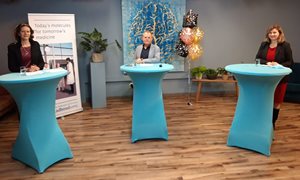
Sjoerd van Deventer, Abbey Arp and Annemiek van Spriel, theme Cancer development and immune defence published in Trends in cell biology that a dynamic plasma membrane organization is a complex symphony.
Membrane protein organization is essential for proper cellular functioning and the result of a dynamic exchange between protein monomers, nanoscale protein clusters, and microscale higher-order structures. This exchange is affected by both lipid bilayer intrinsic factors, such as lipid rafts and tetraspanins, and extrinsic factors, such as cortical actin and galectins. Because membrane organizers act jointly like instruments in a symphony, it is challenging to define the 'key' organizers. Here, the researchers posit, for the first time, definitions of key intrinsic and extrinsic membrane organizers. Tetraspanin nanodomains are key organizers that are often overlooked. The researchers discuss how different key organizers can collaborate, which is important to get a full grasp of plasma membrane biology.
Figure 1. Membrane organization Is a continuous exchange affected by different organizers
Related news items

Rubicon grants awarded to three RIMLS researchers
19 April 2022Three researchers have received Rubicon funding from NWO/ZonMw. This will enable Elke Muntjewerff, Laura de Vries and Laurens van de Wiel to do research at a foreign research institute for the next two years.
go to page
RIMLS awards call for nominations
19 October 2021 RIMLS awards several prizes to stimulate and honor our (young) researchers. Upcoming awards are Supervisor of the Year, Best Master Thesis, Best Publication, Best Image and more. Send your nominations now before 24 November 2021. go to page
RIMLS online award ceremony proudly presenting the winners
13 January 2021In this special webinar of the RIMLS New Year Celebration, scientific director René Bindels reviewed 2020 and looked forward to 2021. But more importantly a number of researchers received prizes in the traditional RIMLS awards ceremony.
go to page
Controlled human malaria infection induces long-term functional changes in monocytes
3 December 2020Robert Sauerwein and Henk Stunnenberg together with Mihai Netea and other colleagues now show for the first time that even a parasitic infection can train the immune system. The article is published in Frontiers in Molecular Biosciences.
go to page
Tumor cells stimulate lipid biosynthesis in macrophages
23 September 2020 RIMLS researchers wrote in the Journal for ImmunoTherapy of Cancer that improved lipid biosynthesis in human tumor-induced macrophages contributes to their protumoral characteristics. go to page
